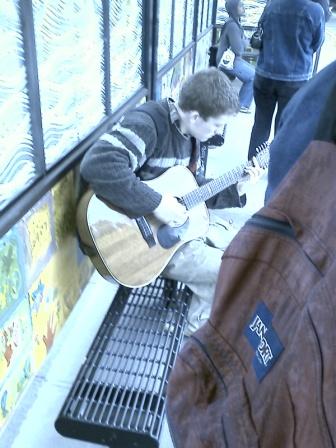Today would have been my mother‘s 66th birthday. Bus Nerd is out of town, but Chicklet, Busling, and I made the pilgrimage to the church where her ashes are buried. (This was the first year we brought home-grown flowers: some Cosmos something-or-others Chicklet and I planted in the spring.) We spent the better part of the day in the neighborhood–lunching with my brother, playing at a nearby park, and–mostly–thinking about how much we miss having her in our lives.
In honor of my amazing mama, I’m reposting my February, 2007, Real Change column:
On Jan. 3, after a four-and-a-half year battle with breast cancer, my mother, Caroline Dunne Saulter, died. She was 61 years old.
Caroline never approved of my choice to live without a car. She blamed herself, for allowing me to ride the bus at such an early age; my father, for showing me how; my husband, for providing my first example of car-freedom; and me, for being my stubborn, willful (and impractical) self. She wanted me to live a mainstream middle-class life, to stay indefinitely when I visited (instead of until the last bus left her neighborhood), to be protected from the elements, and to be inside (either a building or a vehicle) after dark. Despite my unwavering commitment to my choice, she hoped that one day I would grow up, get over it, and just buy a hybrid already.
The irony of this is that it was, in large part, my mother’s example that gave me the courage to step outside the mainstream and choose a life that reflected my values.
Caroline’s commitment to her own ideals began at an early age. Despite her head-turning beauty and easy popularity, she chose not to accept the bigoted views of her peers in the suburban Ohio town where she attended high school and almost always found herself on the “wrong” side of lunch-table arguments. When she was 16, she took a bus by herself from Cleveland to Washington, D.C., to participate in the March on Washington. She remembered the experience as one of the most moving of her life.
In 1966, she left college, joined Volunteers in Service to America (VISTA), and moved to Oregon to help improve conditions for Russian and Mexican migrant workers. It was there that she met my father, a Seattle native and brilliant University of Oregon architecture student who also happened to be Black. They married — at a time when many states still had anti-miscegenation laws — and finished school together.
When Caroline was 28 and most of her girlfriends were shopping preschools, she and my father joined the Peace Corps and moved (along with my older sister, Carey, and me) to Morocco for two years. After we returned, she continued to give her time to the causes she cared about while raising her (eventually four) children.
When she was 57, she was diagnosed with breast cancer. She battled the disease with grace and courage — continuing to participate in life to the extent she was able and, in the process, inspiring countless other cancer patients.
So it is not despite, but because of Caroline that I have chosen to live according to my beliefs. Though her life was cut short, she managed to leave the world in better shape than she found it. How could I, presented with her example, not attempt to do the same?

